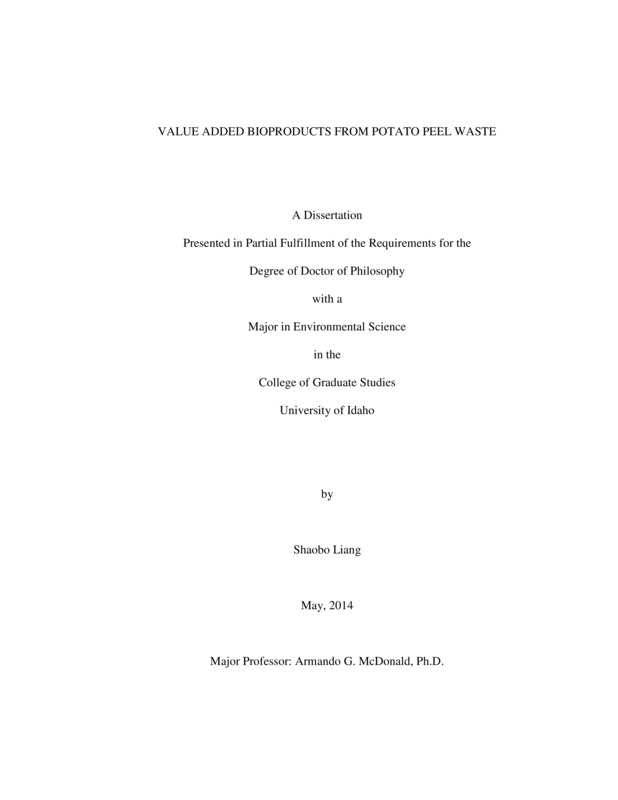Value added bioproducts from potato peel waste
Liang, Shaobo. (2014). Value added bioproducts from potato peel waste. Theses and Dissertations Collection, University of Idaho Library Digital Collections. https://www.lib.uidaho.edu/digital/etd/items/liang_idaho_0089e_10346.html
- Title:
- Value added bioproducts from potato peel waste
- Author:
- Liang, Shaobo
- Date:
- 2014
- Program:
- Environmental Science
- Subject Category:
- Environmental science
- Abstract:
-
Potato peel waste (PPW) is a group of incidental materials (peeling, trimming, cutting, and washing wastes) generated during potato processing, which exhibits a significant management and environmental issue. PPW samples collected from potato processing plants were fully characterized and converted into value added bioproducts through biological and thermochemical processes in this project. For the first time, lactic acid was found as the dominant product of anaerobic fermentation of PPW with undefined mixed cultures. The batch fermentation was studied under different pretreatment processes, enzymatic hydrolysis, temperature and solids loading conditions. The maximum yields of lactic acid, acetic acid, and ethanol were respectively, 0.22, 0.06, and 0.05 g g
-1 , and the highest lactic acid concentration of 14.7 g L-1 was obtained from bioreactor with initial solid loading of 60 g L-1 at 35°C without additional enzymes. Similar fermentation broth compositions were obtained with seed cultures from different municipal wastewater treatment plants, and the Illumina sequencing revealed that the microbial community structures of three seed cultures were different but unique microbial community structures were formed with more than 96% of genusLactobacillus in all three fermenters, as compared to <0.1% in seed cultures. The results of sequencing batch reactor (SBR) experience showed that the decreasing retention time and solids content increased lactic acid production, and a good overall lactic acid yield and productivity (138.0 mg g-1 d-1 ) was achieved in a 3.5 L upscale SBR reactor, and high purity (91%) of aqueous lactic acid (50% w/w) was obtained through activated carbon adsorption, ion-exchange and vacuum condensation, and quantified and confirmed by HPLC and NMR. The un-reacted PPW fermentation residue (PPW-FR) was further utilized for bio-oil and bio-char production with pyrolysis at 450°C and the results showed that a significant amount of hydrocarbon compounds (alkanes and alkenes) in bio-oil with similar aliphatic compounds as transport fuels and the bio-char exhibited better butane adsorption performances and exhibited potential use as an adsorbent. The processes described in this dissertation demonstrated an integrated lab-scale utilization of PPW, which can be used as references for industrial applications. - Description:
- doctoral, Ph.D., Environmental Science -- University of Idaho - College of Graduate Studies, 2014
- Major Professor:
- McDonald, Armando G
- Committee:
- Coats, Erik R; Huber, Kerry C; Shook, Steven R
- Defense Date:
- 2014
- Identifier:
- Liang_idaho_0089E_10346
- Type:
- Text
- Format Original:
- Format:
- application/pdf
- Rights:
- In Copyright - Educational Use Permitted. For more information, please contact University of Idaho Library Special Collections and Archives Department at libspec@uidaho.edu.
- Standardized Rights:
- http://rightsstatements.org/vocab/InC-EDU/1.0/

